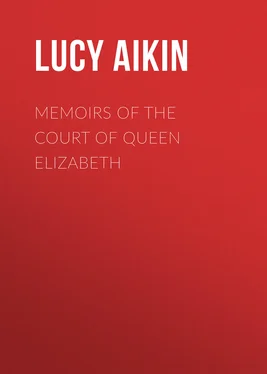Lucy Aikin - Memoirs of the Court of Queen Elizabeth
Здесь есть возможность читать онлайн «Lucy Aikin - Memoirs of the Court of Queen Elizabeth» — ознакомительный отрывок электронной книги совершенно бесплатно, а после прочтения отрывка купить полную версию. В некоторых случаях можно слушать аудио, скачать через торрент в формате fb2 и присутствует краткое содержание. Жанр: foreign_prose, История, foreign_edu, foreign_antique, на английском языке. Описание произведения, (предисловие) а так же отзывы посетителей доступны на портале библиотеки ЛибКат.
- Название:Memoirs of the Court of Queen Elizabeth
- Автор:
- Жанр:
- Год:неизвестен
- ISBN:нет данных
- Рейтинг книги:4 / 5. Голосов: 1
-
Избранное:Добавить в избранное
- Отзывы:
-
Ваша оценка:
- 80
- 1
- 2
- 3
- 4
- 5
Memoirs of the Court of Queen Elizabeth: краткое содержание, описание и аннотация
Предлагаем к чтению аннотацию, описание, краткое содержание или предисловие (зависит от того, что написал сам автор книги «Memoirs of the Court of Queen Elizabeth»). Если вы не нашли необходимую информацию о книге — напишите в комментариях, мы постараемся отыскать её.
Memoirs of the Court of Queen Elizabeth — читать онлайн ознакомительный отрывок
Ниже представлен текст книги, разбитый по страницам. Система сохранения места последней прочитанной страницы, позволяет с удобством читать онлайн бесплатно книгу «Memoirs of the Court of Queen Elizabeth», без необходимости каждый раз заново искать на чём Вы остановились. Поставьте закладку, и сможете в любой момент перейти на страницу, на которой закончили чтение.
Интервал:
Закладка:
Dr. Cox was quite another manner of man. Repairing first to Strasburgh, where the English exiles had formed themselves into a congregation using the liturgy of the church of England, he went thence to Frankfort, another city of refuge to his countrymen at this period; where the intolerance of his zeal against such as more inclined to the form of worship instituted by the Genevan reformer, embarked him in a violent quarrel with John Knox, against whom, on pretext of his having libelled the emperor, he found means to kindle the resentment of the magistrates, who compelled him to quit the city. After this disgraceful victory over a brother reformer smarting under the same scourge of persecution with himself, he returned to Strasburgh, where he more laudably employed himself in establishing a kind of English university.
His zeal for the church of England, his sufferings in the cause, and his services to learning, obtained for him from Elizabeth the bishopric of Ely; but neither party enjoyed from this appointment all the satisfaction which might have been anticipated. The courage, perhaps the self opinion, of Dr. Cox, engaged him on several occasions in opposition to the measures of the queen; and his narrow and persecuting spirit involved him in perpetual disputes and animosities, which rendered the close of a long life turbulent and unhappy, and took from his learning and gray hairs their due reverence. The rapacity of the courtiers, who obtained grant after grant of the lands belonging to his bishopric, was another fruitful source to him of vexation; and he had actually tendered the resignation of his see on very humiliating terms, when death came to his relief in the year 1581, the eighty-second of his age.
If in this and a few other instances, the polemical zeal natural to men who had sacrificed their worldly all for the sake of religion, was observed to degenerate among the refugees into personal quarrels disgraceful to themselves and injurious to their noble cause, it ought on the other hand to be observed, that some of the firmest and most affectionate friendships of the age were formed amongst these companions in adversity; and that by many who attained under Elizabeth the highest preferments and distinctions, the title of fellow-exile never ceased to be regarded as the most sacred and endearing bond of brotherhood.
Other opportunities will arise of commemorating some of the more eminent of the clergy who renounced their country during the persecutions of Mary; but respecting the laity, it may here be remarked, that with the exception of Catherine duchess-dowager of Suffolk, not a single person of quality was found in this list of conscientious sufferers; though one peer, probably the earl of Bedford, underwent imprisonment on a religious account at home. Of the higher gentry, however, there were considerable numbers who either went and established themselves in the protestant cities of Germany, or passed away the time in travelling.
Sir Francis Knowles, whose lady was niece to Anne Boleyn, took the former part, residing with his eldest son at Frankfort; Walsingham adopted the latter. With the views of a future minister of state, he visited in succession the principal courts of Europe, where he employed his diligence and sagacity in laying the foundations of that intimate knowledge of their policy and resources by which he afterwards rendered his services so important to his queen and country.
CHAPTER VII
Arrival of Wyat and his associates at the Tower.—Savage treatment of them.—Further instances of Mary's severity.—Duke of Suffolk beheaded.—Death of lady Jane Grey—of Wyat, who clears Elizabeth of all share in his designs.—Trial of Throgmorton.—Bill for the exclusion of Elizabeth thrown out.—Parliament protects her rights—is dissolved.—Rigorous confinement of Elizabeth in the Tower.—She is removed under guard of Beddingfield—carried to Richmond—offered liberty with the hand of the duke of Savoy—refuses—is carried to Ricot, thence prisoner to Woodstock.—Anecdotes of her behaviour.—Cruelty of Gardiner towards her attendants.—Verses by Harrington.—Marriage of the queen.—Alarms of the protestants.—Arrival of cardinal Pole.—Popery restored.—Persecution begun.—King Philip procures the liberation of state prisoners.—Earl of Devon travels into Italy—dies.—Obligation of Elizabeth to Philip discussed.—She is invited to court—keeps her Christmas there—returns to Woodstock—is brought again to court by Philip's intercession.—Gardiner urges her to make submissions, but in vain.—She is brought to the queen—permitted to reside without guards at one of the royal seats—finally settled at Hatfield.—Character of sir Thomas Pope.—Notice of the Harringtons.—Philip quits England.—Death of Gardiner.
Tt is now proper to return to circumstances more closely connected with the situation of Elizabeth at this eventful period of her life.
Two or three weeks before her arrival in the Tower, Wyat with some of his principal adherents had been carried thither. Towards these unhappy persons, none of those decencies of behaviour were observed which the sex and rank of Elizabeth had commanded from the ministers of her sister's severity; and Holinshed's circumstantial narrative of the circumstances attending their committal, may be cited as an instructive example of the fierce and brutal manners of the age.
"Sir Philip Denny received them at the bulwark, and as Wyat passed by, he said, 'Go, traitor, there was never such a traitor in England.' To whom sir Thomas Wyat turned and said, 'I am no traitor; I would thou shouldest well know that thou art more traitor than I; it is not the point of an honest man to call me so.' And so went forth. When he came to the Tower gate, sir Thomas Bridges lieutenant took in through the wicket first Mantell, and said; 'Ah thou traitor! what hast thou and thy company wrought?' But he, holding down his head, said nothing. Then came Thomas Knevet, whom master Chamberlain, gentleman-porter of the Tower, took in. Then came Alexander Bret, (captain of the white coats,) whom sir Thomas Pope took by the bosom, saying, 'O traitor! how couldst thou find in thy heart to work such a villainy as to take wages, and being trusted over a band of men, to fall to her enemies, returning against her in battle?' Bret answered, 'Yea, I have offended in that case.' Then came Thomas Cobham, whom sir Thomas Poins took in, and said; 'Alas, master Cobham, what wind headed you to work such treason?' And he answered, 'O sir! I was seduced.' Then came sir Thomas Wyat, whom sir Thomas Bridges took by the collar, and said; 'O thou villain! how couldst thou find in thy heart to work such detestable treason to the queen's majesty, who gave thee thy life and living once already, although thou didst before this time bear arms in the field against her? 22 22 It is plain that Wyat is here accused of having taken arms for Jane Grey; but most wrongfully, if Carte's account of him is to be credited, which there seems no reason to disbelieve.
… If it were not (saith he) but that the law must pass upon thee, I would stick thee through with my dagger.' To the which Wyat, holding his arms under his sides and looking grievously with a grim look upon the lieutenant, said, 'It is no mastery now;' and so passed on."
Other circumstances attending the suppression of this rebellion mark with equal force the stern and vindictive spirit of Mary's government, and the remaining barbarity of English customs. The inhabitants of London being for the most part protestants and well affected, as the defection of their trained bands had proved, to the cause of Wyat, it was thought expedient to admonish them of the fruits of rebellion by the gibbeting of about sixty of his followers in the most public parts of the city. Neither were the bodies suffered to be removed till the public entry of king Philip after the royal nuptials; on which festal occasion the streets were cleared of these noisome objects which had disgraced them for nearly half a year.
Читать дальшеИнтервал:
Закладка:
Похожие книги на «Memoirs of the Court of Queen Elizabeth»
Представляем Вашему вниманию похожие книги на «Memoirs of the Court of Queen Elizabeth» списком для выбора. Мы отобрали схожую по названию и смыслу литературу в надежде предоставить читателям больше вариантов отыскать новые, интересные, ещё непрочитанные произведения.
Обсуждение, отзывы о книге «Memoirs of the Court of Queen Elizabeth» и просто собственные мнения читателей. Оставьте ваши комментарии, напишите, что Вы думаете о произведении, его смысле или главных героях. Укажите что конкретно понравилось, а что нет, и почему Вы так считаете.












